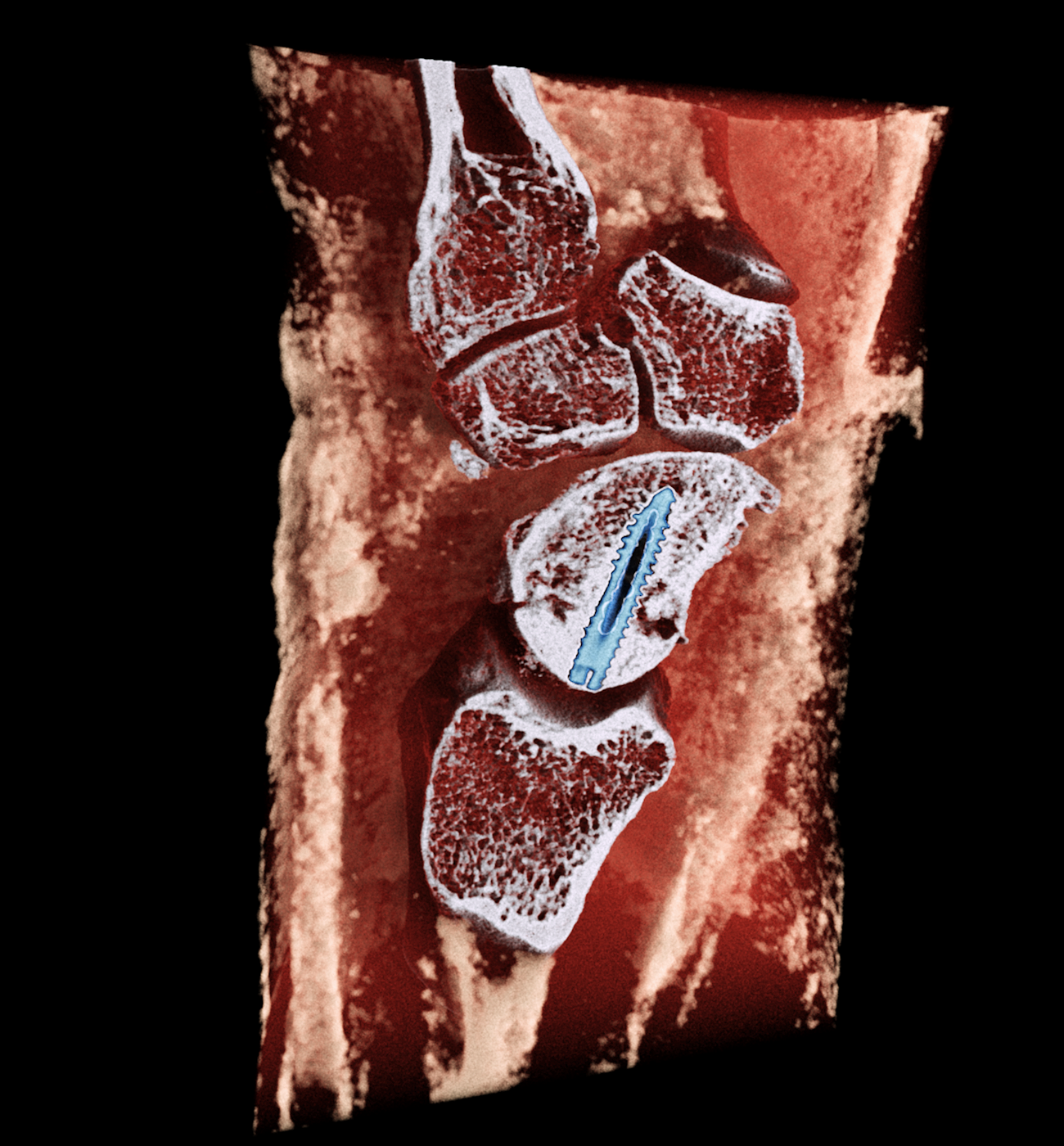Read the original press release on the HSS website or our partner MBI's website.
Hospital for Special Surgery (HSS), the world’s leading academic medical center specialized in musculoskeletal health, and New Zealand-based medical device and technology company MARS Bioimaging Limited (MARS) today announced a new collaborative relationship based on MARS’s photon-counting spectral CT imaging technology.
Through the HSS Innovation Institute, HSS and MARS will collaborate to advance musculoskeletal imaging and diagnosis, including evaluation of specific aspects of the MARS 5×120 Extremity Scanner and potential co-development of new scanning technologies and systems.
The MARS 5×120 Extremity scanner is based on detector technology that was initially developed as part of ongoing particle physics research at the European Laboratory for Particle Physics (CERN), where the Higgs Boson was discovered. The MediPix3 detector technology previously enabled MARS’s development of the world’s first commercial (2010) photon counting 3-D color x-ray, producing high contrast images of bone detail and assessment of bone density at a fracture site at a significantly reduced radiation dose compared to traditional CT. The MARS 5×120 Extremity scanner is designed as a “point-of-care” system, intended for use in clinical office and ambulatory settings, addressing clinical needs such as pre- and post-surgical planning, assessment of fracture healing, and identification of implant complications.
HSS Department of Radiology and Imaging Chairperson Hollis Potter, MD is enthusiastic about the HSS- MARS collaboration:"Our team looks forward to collaborating with MARS to assess the technology and pursue other new applications and development opportunities. We see this type of imaging modality as the next evolution in CT scanners; as HSS physicians and innovators, our goal of continuously improving patient care and outcomes includes identifying and pursuing new technologies , as well as developing partnerships that leverage HSS’s expertise and innovative spirit with cutting-edge industry advancements to drive innovation."
"We’re pleased that a world-class clinical organization like HSS sees the potential for the MARS CT scanning technology", says MARS CEO Mark Figgitt. "Given their substantial experience and expertise in the field of musculoskeletal health, including the volume of orthopedic surgeries performed there, we are confident that HSS is the right partner to help us evaluate and develop our technology and clinical applications. We believe this will be a true collaboration where the complimentary expertise of both organizations come together to improve clinical care and lower costs."
Michael Campbell, Spokesperson for the Medipix3 collaboration at CERN, said, "It is great to see the efforts of CERN and the Medipix3 Collaboration playing a pivotal role in bringing innovations in medical imaging for the benefit of the global medical community."
About MARS Bioimaging Limited
MARS Bioimaging was launched in 2007 by father and son team Professor Phil Butler, then Head of the New Zealand CERN research group, and his son Professor Anthony Butler, a clinical radiologist and Director of Radiology at the University of Otago, Christchurch. MARS was formed to commercialize the ground breaking MARS technology and bring photon counting CT to the clinic. To achieve this the company brought together an interdisciplinary research and development team of physicists, radiologists, engineers, computer scientists, orthopaedic and other surgeons, mathematicians, biologists, and cancer researchers. MARS systems are based on next generation x-ray detectors (Medipix3RX) developed under the Medipix3 collaboration hosted by CERN, and other partners, including the University of Canterbury (UC). In association with UC and University of Otago, Christchurch (UOC), MARS now has a team working on developing new preclinical and clinical applications for photon-counting technology. This includes, but is not limited to, bone and joint health, cancer, cardiovascular disease, and infectious disease. MARS has established itself as the world’s leading research and development group in spectral molecular imaging and to-date has delivered the world’s first commercial pre-clinical spectral CT scanner (MARS Microlab 5X120), as well as a compact human system for upper extremity evaluation (MARS Extremity 5X120).
MARS’s technology and company have received several awards, including: HealthTech Award for Best Translational Project in HealthTech Week; Supreme Small Enterprise in the Champion Canterbury Awards; and Best Health and Science Innovation and Best Emerging Innovation at the NZ Innovation Awards.
About HSS
HSS is the world’s leading academic medical center focused on musculoskeletal health. At its core is Hospital for Special Surgery, nationally ranked No. 1 in orthopedics (for the 13th consecutive year), No. 3 in rheumatology by U.S. News & World Report (2022-2023), and the best pediatric orthopedic hospital in NY, NJ and CT by U.S. News & World Report “Best Children’s Hospitals” list (2022-2023). In a survey of medical professionals in more than 20 countries by Newsweek, HSS is ranked world #1 in orthopedics for a third consecutive year (2023). Founded in 1863, the Hospital has the lowest readmission rates in the nation for orthopedics, and among the lowest infection and complication rates. HSS was the first in New York State to receive Magnet Recognition for Excellence in Nursing Service from the American Nurses Credentialing Center five consecutive times. An affiliate of Weill Cornell Medical College, HSS has a main campus in New York City and facilities in New Jersey, Connecticut and in the Long Island and Westchester County regions of New York State, as well as in Florida. In addition to patient care, HSS leads the field in research, innovation and education. The HSS Research Institute comprises 20 laboratories and 300 staff members focused on leading the advancement of musculoskeletal health through prevention of degeneration, tissue repair and tissue regeneration. The HSS Innovation Institute works to realize the potential of new drugs, therapeutics and devices. The HSS Education Institute is a trusted leader in advancing musculoskeletal knowledge and research for physicians, nurses, allied health professionals, academic trainees, and consumers in more than 165 countries. The institution is collaborating with medical centers and other organizations to advance the quality and value of musculoskeletal care and to make world-class HSS care more widely accessible nationally and internationally. www.hss.edu.

